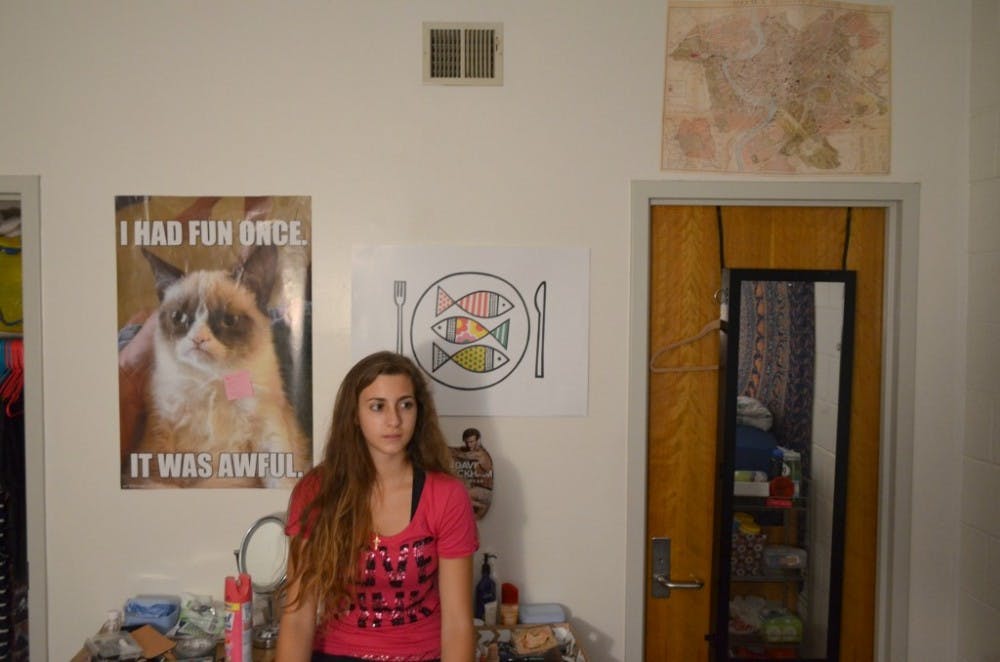A Physical Plant work request backlog has left Elon University students scattered across Danieley Center frustrated by failing facilities ranging from interior flooding to mold-covered ventilators.
It’s a recurring problem, one not uncommon to the beginning of the school year when the requests start pouring in, said Paul Holt, maintenance control manager for Physical Plant.
From 2012 to 2013, Physical Plant received 24,260 work orders — a number this school year has already exceeded with 26,460 requests placed so far.
Dubbed a “beginning of the year bottleneck effect” by Holt, students who have been living with the lingering backlog have been less than content.
Sophomores Emily Rawls, Bettina Geissbuehler, Francesca Collins and Doriana Moody moved into a damp Danieley C apartment that smelled of dead fish — a stench later attributed to mold covering the aging apartment’s air filters.
“When we moved in, there was this funny, nasty smell for a long time, and we couldn’t figure out what it was,” Rawls said, adding that a hint of mold on the side of her dresser provided a clue. “Some things are very strange here.”
The strangeness continued for the four friends. As the mold continued its slow, unchecked spread, they noticed other apartment ailments — a certain steady dripping within a bathroom wall and other little alarm bells.
After three work requests sent online to Physical Plant, Geissbuehler — who is allergic to mold — gave up and called. The next day, a worker showed up and fixed the filters, advising the four to stay on the lookout for signs of the mold’s return.
They aren’t the only Danieley residents who have run into problems.
Sophomore Katie Condon, a resident of Danieley E, had an issue that required more urgent attention: a ceiling hallway light filled with water from a leaking dishwasher upstairs that sloshed more than an inch of water through the upstairs apartments and leaked through the floor, to downstairs.
The light remained filled with water for about a week, taking two to three requests from Condon. After the toilet started leaking and a shower light filled with water, Condon had enough and called. A worker came the next day.
“It’s more of an annoying headache for our building,” Condon said. She added that she was most concerned about the dangerous mix of water and electricity in her shower. “Our building hasn’t caught on fire. But at the same time, it’s like, we’re all paying to live here. If it was a regular housing situation — an off-campus situation — you wouldn’t want to live here anymore.”
For those with more dangerous, and potentially life-threatening issues, Holt suggests a speedier remedy: FIXIt, a Physical Plant Initiative to contact the department 24/7 in the event of an emergency. In such a situation, Elon University Campus Safety is supposed to respond immediately and determine the appropriate response.
Postcards for the program were distributed to freshmen in all residence halls with directions and contact information. Physical Plant has also made it a point to further educate faculty and staff on how to report a problem themselves, without having to wait for someone else to do it.
Physical Plant’s 197 full-time employees always have their hands full at the beginning of each school year, Holt said. But that doesn’t mean the quick solution is more hires because the new employees would be nonessential in slower times for requests, when the school year moves into full swing.
“Just because of the bottleneck, if you hire folks [who] have the experience they need, you’re talking about a whole lot of money to get those folks,” Holt said. “It’s hard to say you get them temporarily and then go back, because you can’t pay manpower like that the whole year ... it would be too much in the leaner times.”
The opening of new buildings and residence halls — such as the Global Neighborhood — has added strain to the existing workforce. Physical Plant employees, according to Holt, must work out the hiccups that come with any new structure.
“As far as residence areas, there’s quite a bigger piece there because we’ve got more people putting in work requests,” he said.
Sophomore Ryan Finn, a Danieley E resident and neighbor of Rawls and the others, is more frustrated by what he says is an Elon attitude to build new buildings instead of renovating existing spaces, forgetting about the old in an embrace of the new.
Finn’s troubles — a fidgety lightswitch, a stop-and-start sink and a tempermental shower — pale in comparison, he said, to others living with mold or other apartment ailments.
Though he’s not happy about the deteriorating condition of his apartment, the sophomore doesn’t blame Physical Plant for his troubles.
He’s upset with the university.
“I don’t really blame these guys,” he said. “It’s not their fault the school chooses to build a new admissions center rather than improve on Danieley.”
The university’s budget is a yearly balancing act, according to Holt, who has particpated in the procedure in years past. He said it’s easy to assign blame and that everyone can’t be happy in a school with thousands of students, faculty and staff.
“[The administration] looks at each budget year and determines what the needs are, and I would say that’s at this point that the administration feels we’ve got to put the balance in everything, together with academics,” he said.
Not satisfied with her Danieley experience thus far, Rawls thinks a quick glance around campus at the “glamor” of the Oaks and the Global Neighborhood proves more could be done for the students living on the outskirts near Lake Verona.
“It’s just the little things,” Rawls said. “But then you look at it, and yeah, Danieley’s older, but you clearly could have fixed some of these problems or prevented them from happening to begin with.”


